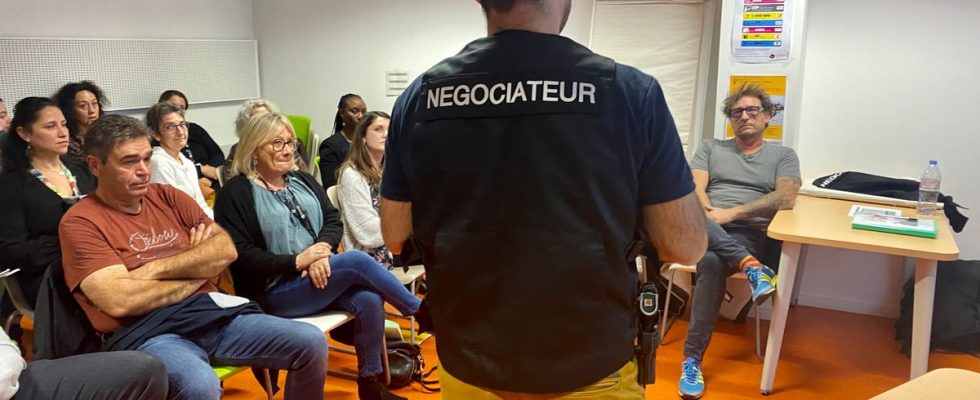In a small room at the Maison du Département et des Solidarités (MDS) in Saint-André-de-Cubzac, north of Bordeaux, two negotiators from the Nouvelle-Aquitaine gendarmerie face around twenty agents from the departmental council of the Gironde. In turn, they will make them relive a situation of extreme tension, by playing a particularly aggressive user, for example an elderly person who has come to complain about their home help, or a father whose child has just been taken away. The objective is to teach these departmental agents, most of whom work to welcome the public in MDSs in Gironde, to deal with incivility, or even attacks.
This session is part of a partnership between the gendarmerie and the Gironde departmental council, officially launched this Tuesday, with the aim of improving personal safety. “This responds to a need expressed by agents, who have noted an increase in tension, particularly since Covid-19, even if we cannot yet measure the incidence of physical and verbal attacks,” explains Sébastien Saint-Pasteur, vice -president of the Gironde departmental council in charge of access to law and digital technology.
This training is given by regional gendarmerie negotiators, “themselves trained by GIGN negotiators” explains squadron leader Sébastien Andrieu, of the Gironde gendarmerie group. “They will help the department’s agents to understand tense situations and defuse emerging crises, because behind the aggressive behavior of a user, there is always something underlying that must be successfully identified, before this does not escalate into verbal or physical violence. »
“Isolation has been very difficult for some people, and returning to normal life is not easy”
Violence that Delphine, social secretary at MDS de Blaye, in charge of welcoming the public, recently experienced. “We experienced an extremely violent verbal attack aimed at several agents. It was a peak, but we also regularly experience incivility,” she explains. If these are not daily, “which is the case in other MDS”, they have nevertheless been increasing in recent years. “Since the Covid period, many more people feel exhausted, in phases of psychological exhaustion. Isolation has been very difficult for some, and returning to normal life is not easy. At the same time, the deterioration of the situation on a social and economic level also has repercussions on the public we receive on a daily basis, who were already fragile before that. »
“The tension in interprofessional relations is increasing, I think everyone can see it on a daily basis,” adds squadron leader Sébastien Andrieu. The population has a diminishing capacity for resilience to annoyance, so we must adapt and be able to identify the problems of the people in front of us. »
“When faced with an aggressive person, you have to let them vent their emotions”
This training “is very important to help us react on a daily basis,” continues another agent from the department. “The police remind us that we are on the front line, and that when we are faced with an aggressive person, we must let them vent their emotions, without interrupting them, and without letting our own emotions show,” continues Delphine. “Afterwards, in principle, we can talk. »
“Our advice also revolves around things not to say,” adds the squadron leader. For example, telling someone who is upset to keep calm is counterproductive. Then, you have to be able to ask the right questions, and make it clear that there is a person opposite who is interested in the problem, which helps to relieve the pressure. »
“There are people to whom we have to explain that they will not see their child the next day”
Sébastien Saint-Pasteur emphasizes the situations of distress, which the department’s agents sometimes have to face. “We have 32 sites in Gironde which welcome nearly 150,000 people each year, which means that almost one in ten Girondins spends each year in an MDS, for maternal and child protection, or social protection… And there to people to whom we must explain that they will not see their child the next day, or who may find themselves with a breach of law… We must understand these situations of extreme fragility, even if this in no way justifies aggressiveness towards -to our agents. »
The agreement with the gendarmerie lasts three years. “We aim to train 150 agents per year during this period,” continues the elected official, knowing that we have approximately 300 agents who work in MDS receptions – out of the 6,000 in the department – and agents on the roads, in colleges, which may also be affected by this incivility. »

